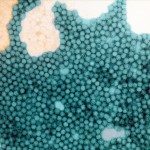Lien vers Pubmed [PMID] – 14972536
Virology 2004 Jan;318(1):66-78
Immunodeficient patients whose gut is chronically infected by vaccine-derived poliovirus (VDPV) may excrete large amounts of virus for years. To investigate how poliovirus (PV) establishes chronic infections in the gut, we tested whether it is possible to establish persistent VDPV infections in human intestinal Caco-2 cells. Four type 3 VDPV mutants, representative of the viral evolution in the gut of a hypogammaglobulinemic patient over almost 2 years [J. Virol. 74 (2000) 3001], were used to infect both undifferentiated, dividing cells, and differentiated, polarized enterocytes. A VDPV mutant excreted 36 days postvaccination by the patient was lytic in both types of intestinal cell cultures, like the parental Sabin 3 (S3) strain. In contrast, three VDPVs excreted 136, 442, and 637 days postvaccination, established persistent infections both in undifferentiated cells and in enterocytes. Thus, viral determinants selected between day 36 and 136 conferred on VDPV mutants the capacity to infect intestinal cells persistently. The percentage of persistently VDPV-infected cultures was higher in enterocytes than in undifferentiated cells, implicating cellular determinants involved in the differentiation of enterocytes in persistent VDPV infections. The establishment of persistent infections in enterocytes was not due to poor replication of VDPVs in these cells, but was associated with reduced viral adsorption to the cell surface.
